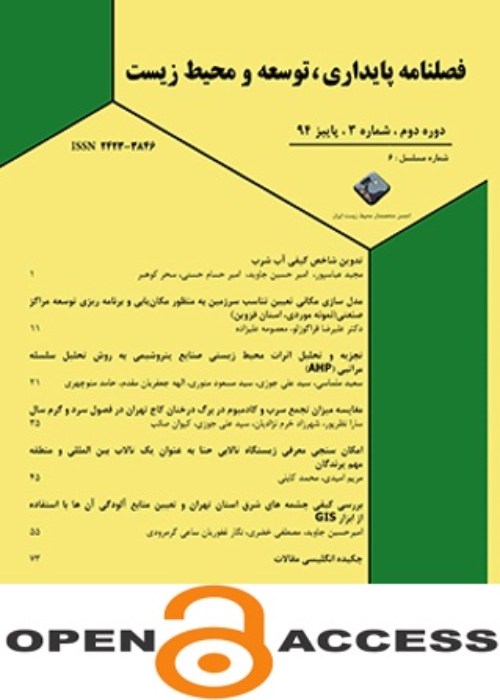Recycling of Municipal Solid Wastes Through Vermicomposting Process (Case Study-Municipal Solid Wastes of the City of Mashhad)
Author(s):
Abstract:
The current research was conducted to reduce the environmental problems associated with solid wastes producted in cities. The main objective of this research were to investigate : a) The applicability of recycling of the city of Mashhad municipal solid wastes through its conversion to vermicompost and b) The effects of different substrate mixtures on the process efficiency, the quality of the final composting product, and on the trend of change in number and biomass of the earthworms. This research was performed in a complete randomized design with five types of substrate mixture and with three replica for each type of treatment. The substrate mixtures included municipal solid wastes and cow manure (both pretreated) in percent ratios of 20:80, 40:60, 60:40, 80:20 and 100%, respectively (on the basis of total dry matter). The units with 100% municipal solid wastes were considered as control units. The earthworms Eisenia fetida was used in this work. The experimental period lasted 80 days. During the course of this study, various physical, chemical and biological parameters such as TVS, TOC, TKN, TP, TK, TNa (all measured as percentage of total dry matter), C/N ratio, pH, EC as well as the number and biomass of earthworms were measured regularly. Statistical assessment of the results was done using SPSS software. The results showed a significant reduction in TOC, TVS, pH, and the C/N ratio of the substrates in all treatment units, as compared to their initial values. However, the change in substrate TKN, TP, TK, TNa, and EC followed a significant increase during the experimental period. Moreover the measurements indicated a considerable increase in the number and biomass of Eisenia fetida in every treatment units. The treatment units consisted of 100% municipal solid wastes showed the best results from the viewpoints of stabilization of organic matter, fertilization value of the final compost produce, and the amount of earthworms biomass produced. This indicates that in such units the environmental conditions were more suitable for the biological activities of the earthworms and microorganisms. As a result for vermicomposting of municipal solid wastes there is no need for addition of additives such as cow manure to the substrate.The results of this research also showed that the process of vermicomposting in all treatment units were accomplished during the first 60 days of the experimental period.
Keywords:
Language:
Persian
Published:
Journal of Sustainability, Development and Environment, Volume:2 Issue: 1, 2015
Pages:
1 to 16
magiran.com/p1691082
دانلود و مطالعه متن این مقاله با یکی از روشهای زیر امکان پذیر است:
اشتراک شخصی
با عضویت و پرداخت آنلاین حق اشتراک یکساله به مبلغ 1,390,000ريال میتوانید 70 عنوان مطلب دانلود کنید!
اشتراک سازمانی
به کتابخانه دانشگاه یا محل کار خود پیشنهاد کنید تا اشتراک سازمانی این پایگاه را برای دسترسی نامحدود همه کاربران به متن مطالب تهیه نمایند!
توجه!
- حق عضویت دریافتی صرف حمایت از نشریات عضو و نگهداری، تکمیل و توسعه مگیران میشود.
- پرداخت حق اشتراک و دانلود مقالات اجازه بازنشر آن در سایر رسانههای چاپی و دیجیتال را به کاربر نمیدهد.
In order to view content subscription is required
Personal subscription
Subscribe magiran.com for 70 € euros via PayPal and download 70 articles during a year.
Organization subscription
Please contact us to subscribe your university or library for unlimited access!


